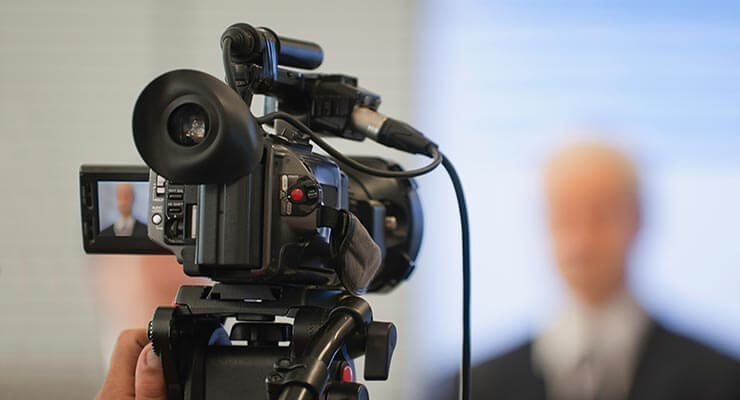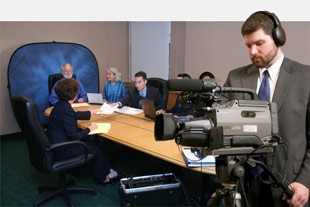Reliable Legal Videography for Legal Success.
Reliable Legal Videography for Legal Success.
Blog Article
The Function of Lawful Videography in Depositions and Trials
Legal videography has actually become an important tool in both depositions and tests, giving a diverse method to documenting witness testaments. By catching not only the talked word however also the subtleties of non-verbal interaction, this medium enhances the credibility of testaments and protects crucial proof for future proceedings (legal videography). As attorneys increasingly identify its value, it motivates a much deeper examination of just how these visual documents can influence juror understandings and test results. What implications might these advancements hold for the future of lawful technique?

Importance of Lawful Videography
Legal videography plays a pivotal function in the paperwork and discussion of depositions and trials. This specific area incorporates technical skills with lawful knowledge to produce a dependable document of process that can significantly influence situation end results. The visual aspect of legal videography improves the understanding of witness testament, permitting jurors and courts to observe not only the spoken words but likewise the temperament, emotions, and body language of the witnesses.
Additionally, legal videography offers an objective account of events, reducing the potential for misinterpretation that can occur with composed records alone. This visual paperwork works as a critical device throughout test presentations, facilitating a clearer and even more convincing narrative for both complainants and offenders. Moreover, the capability to replay video sectors throughout court procedures enables lawful teams to emphasize vital factors, reinforcing their arguments properly.
The relevance of lawful videography expands beyond the court room; it likewise plays a vital function in preserving proof for future reference, whether for charms or further lawful action. Therefore, its integration right into the legal procedure is essential for making certain a fair and exact representation of the truths, ultimately adding to the pursuit of justice.

Process of Legal Videography
While catching the nuances of depositions and trials, the procedure of lawful videography involves several essential steps that guarantee high-grade, accurate recordings. Initially, an expert legal videographer prepares by examining the instance products and recognizing the specific requirements of the deposition or trial. This prep work consists of familiarizing themselves with the participants and the context, which helps in catching essential information.
On the day of the recording, the videographer establishes up the required devices, which usually includes high-definition video cameras, microphones, and appropriate lighting. Guaranteeing optimal angles and sound top quality is important, as it directly impacts the effectiveness of the recording. The videographer communicates with lawyers and individuals to establish protocols, ensuring that every person recognizes the recording procedure.
During the deposition or trial, the videographer meticulously videotapes the process, paying close interest to both verbal and non-verbal cues. This includes catching the temperament and responses of witnesses and attorneys. After the session concludes, the videographer might edit the footage for quality and compliance with legal criteria, producing a last item that accurately shows the proceedings for future referral and use in lawful contexts.
Advantages in Depositions
The unification of videography in depositions provides numerous benefits that enhance the total process of gathering proof. One main benefit is the capability to Discover More catch witness testimonies with aesthetic and auditory fidelity, supplying a much more accurate depiction of the witness's attitude, tone, and body language. This multidimensional technique allows lawyers and juries to evaluate credibility better than traditional written records alone.
Additionally, videographed depositions act as an effective device for preserving testament. Should a witness ended up being unavailable for trial, their videotaped deposition can be played in court, guaranteeing that their proof remains obtainable and appropriate. This facet substantially reduces the danger of shedding crucial info that can influence case results.

Lastly, videography enhances the overall professionalism and reliability of the deposition process, instilling confidence in clients regarding the thoroughness of their lawful depiction (legal videography). By leveraging modern technology, lawyers can substantially enhance the efficiency of depositions
Impact on Tests
In several tests, the combination of videography can significantly affect the discussion of evidence and the jury's assumption. Lawful videography captures witness testaments and essential proof in a dynamic format, permitting jurors to involve with the material on numerous levels. This visual component improves the storytelling aspect of a trial, providing context and psychological resonance that conventional text-based evidence might lack.
Furthermore, video clip recordings can offer as powerful devices for impeachment throughout interrogation. When discrepancies emerge in between a witness's prior declarations and their courtroom testament, video proof offers an objective recommendation that can sway jurors' point of views. This immediacy and clearness can bolster the trustworthiness of a party's narrative while at the same time threatening opposing disagreements.

Future Trends in Legal Videography
As we look toward the future of legal videography, a number of emerging trends promise to reshape its role within the courtroom. One significant trend is the integration of synthetic intelligence (AI) in video analysis and editing. AI can streamline the procedure of recognizing vital minutes in taped depositions, enabling attorneys to rapidly access relevant content, thereby enhancing performance in instance prep work.
Furthermore, the rise of virtual fact Bonuses (VIRTUAL REALITY) and increased reality (AR) technologies is expected to change exactly how jurors experience evidence. legal videography. By submersing jurors in a substitute atmosphere, these technologies can give a more profound understanding of complex situations, leading to even more enlightened deliberations
Moreover, the raising need for remote depositions, accelerated by the COVID-19 pandemic, will likely continue. Legal videographers will certainly require to adapt to new software application and platforms to make certain high-grade recordings in online settings.
Lastly, the expanding emphasis on data security will require stricter procedures for storing and sharing video clip evidence. As the legal landscape advances, legal videographers have to stay abreast of these trends to keep their relevance and performance in the judicial process.
Final Thought
In summary, legal videography serves a vital feature in the judicial process, enhancing the integrity of depositions and trials. As innovation proceeds to advance, legal videography is poised to additional transform its function within the lawful landscape.
Report this page